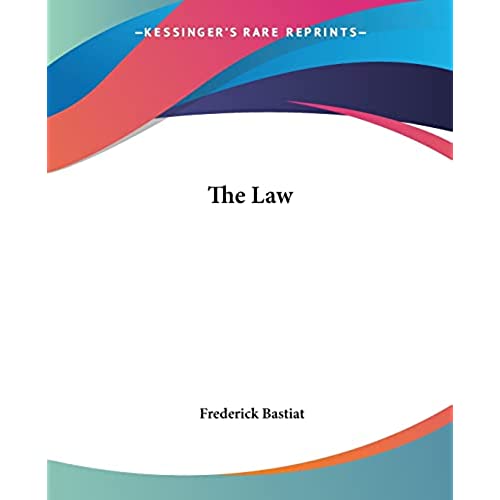

The Law
-

Stjepan
> 24 hourAfter reading all the comments on the content of this book with such a dominance of five stars, my expectation was maybe too high. This high expectation was probably the cause for not being stunned after reading this book and not giving it unconditional glory and perfect score. However, for anyone dealing with politics, economics and law this is a must read. A must read not for one time, but rather maybe once a year just to keep the idea of liberty and nature of governance fresh and accurate. The need for reread is caused also by the the writing style and the pure content of the book. Writing style is obviously little bit archaic and can be sometimes burdensome. Numerous quotations of influential philosophers of our past which carry from time to time more serious philosophical traits, will also push you to reread some lines for better understanding and deeper reflection. In my opinion the end of the book and final conclusion is the most impressive part and its strongest point. In less than a one page story of a newborn child and its future capacities, author succeeds to encircle very descriptively central idea of entire book, which is the idea of human liberty and how it should be treated. Timeless and illuminating, but as I said, in some parts little bit flat and hard to read.
-

H. Herstad
> 24 hourI think that other reviews have done a fine job of praising the importance and genius of Bastiats work. And I thoroughly enjoyed his reasoning and clarity as well. But I was pretty disappointed by the quality of this edition. The book has misplaced punctuation and typos in it -- the kind that would be caught by a simple spell checker. Maybe Im picky, but I find such errors to be rather distracting when reading. When I buy a book, I expect that someone has carefully proofread it, but somehow that seems to have been overlooked here. So, 5+ stars for Bastiat, and a generous 2 stars for the publisher.
-

Asa Ferguson
> 24 hourThe Law is a name that doesnt turn a person on to read this book. The book itself is a reflection of our present day culture that is in need of a renewal of the values that this nation once held dear. As a young man I heard men that I looked up to say things like the lord willing we will have a good crop . These were men who were not church going people but the culture praised hard work,truth,and generally values that dealt with having good character. Women were respected and children protected from bad language and men had honor. The present generation and the ones that came before have been on a slow downward path that this man MR. Bastiat is warning his nation France about . Our nation was the greatest nation ever to bring a people to real freedom but we have lost it to the desire for free stuff and we no longer have a love for the things we create with the work of our hands. If the culture will return to the founders values there is hope. I am 73 and dont think it will happen in my life time, but could if The Law written by Frederic Bastiat were to be in braced by the home ,the church, and the government there would be hope.
-

Walter F. Kailey
> 24 hourFrederic Bastiat was a man of my kidney. This is a clear, simple crie de cour from someone who saw the law perverted to an instrument of plunder to almost everyones injury. He is eloquent in his plea for reform. The evil he wants to eradicate is socialism, and its face is all to familiar to readers 150 years after he wrote this powerful critique. Alas, we never learn.
-

ThinkWinWin
> 24 hourIf you have no idea what Libertarianism is and would like to understand, this would be a wonderful book for you. I got my mom to read it and she loved it. Its only around 70 pages, so its really short. But there is so much philosophy in here that it will blow your mind. If I could add any one book to the high school curriculum throughout the U.S., it would be this book. The title of the book is called The Law. The title gives away the whole message. Bastiat shares his views on what the function of law should be in any society. Here is the folly that we have committed in this modern day of legislation - Here I encounter the most popular fallacy of our
-

G. Allen
> 24 hourBastiat is a must read for everyone. Inexpensive and a quick read. Plunder abounds, so buy this book for everyone you know.
-

Dimitri Chernyak
> 24 hourExcellent overview of what the role of law is in the society and how it has been morphed into a tool of power by people who think they know better how people ought to behave. Must read.
-

Keith
> 24 hourThe antithesis to Communist Manifesto written the same decade.
-

JR
> 24 hourTo the point! Explains the foundation of law that stands today.
-

Christina
> 24 hourPrescient book for what happened to the U.S. At the time this book was written, the author considered the U.S. one of the most just nations, but he described perfectly what happens, and did happen, when you have an increase in the size of government, and the power of the legislators to legally plunder the citizens through the laws they enact.
